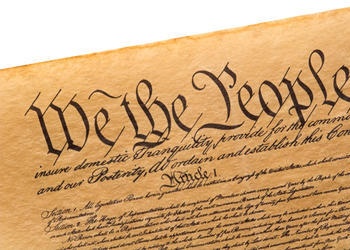Where Does Religious Liberty Come From?

The Heritage Foundation, a United States based conservative think tank, is promoting the next two weeks as focusing on religious freedom. Calling it a Fortnight for Freedom they are using this period leading to the Fourth of July to create awareness of the ever present danger to religious freedom in America. I see also that U.S. Catholic bishops are promoting the same. Regardless of who is behind any effort to raise awareness of religious freedom I would say that all people, everywhere, regardless of faith should be constantly vigilant for personal freedom.
Human government, no matter what the form—whether secular or religious, is historically the greatest threat to religious freedom. This does not take a lot of research to confirm.
The Obama administration has run into a buzz saw of criticism for its healthcare mandate that says religious and faith-based institutions must provide insurance for their employes to buy contraceptive methods, even if it violates that religious body's belief. This is why the Catholic bishops are united and extremely vocal against this measure.
Regardless of your belief on any given religious or conscience issue it is important that you maintain vigilance on any issue of personal freedom. I have been a part of a government intrusion into my church's affairs, and I fully understand the principle of religious liberty. Guarantees of freedom, in whatever form, are vital and important to maintain. You should never let down your vigilance on this issue.
The Constitution of the United States of America enshrines religious freedom in its First Amendment. It reads:
Congress shall make no law respecting an establishment of religion, or prohibiting the free exercise thereof; or abridging the freedom of speech, or of the press; or the right of the people peaceably to assemble, and to petition the Government for a redress of grievances.
Religious pluralism in America has historically been one of the biggest reasons for its success. The framers of the Constitution desired to avoid the religious war and complications of Europe. They intended there would be no one religion that would dominate the politics and culture of the newly formed nation. All citizens would have freedom of religion, and yes, even freedom to not be religious or a believer, should they choose. This has allowed many established religions to flourish. It has allowed many unique forms of religion to originate here as well. Pentecostalism and Mormonisn are two examples.
The apostle Paul's statement in 2 Corinthians 3:17 sets a biblical baseline for this subject. "Now the Lord is the Spirit; and where the Spirit of the Lord is, there is liberty." One of the fundamental facts of the Bible is God's gift of choice to mankind. It is a two-sided gift that can bring both blessing and cursing (Deuteronomy 30:19), but when the right choice is made it results in good. True liberty, of any kind, originates with God.
Where religious freedom exists the gospel of Jesus Christ and the Kingdom of God can be preached and can flourish. America's long and distinguished history has produced such an environment. Let us be glad and give thanks for that. The most important thing we can do is continue to pray as Paul taught that the gospel might have the ability to be preached without hindrance. "Finally, brethren, pray for us, that the word of the Lord may run swiftly and be glorified, just as it is with you"(2 Thessalonians 3:1).
